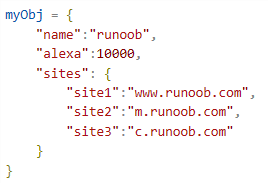java解析多层嵌套json字符串
java分别解析下面两个json字符串


package jansonDemo; import com.alibaba.fastjson.JSON; import com.alibaba.fastjson.JSONArray; import com.alibaba.fastjson.JSONObject; public class TestJSON { /** * JSON实际上也是键值对("key":"value") * key 必须是字符串,value 可以是合法的 JSON 数据类型(字符串, 数字, 对象, 数组, 布尔值或 null) * value如果是字符串,用jsonobj.getString("key")获取 * value如果是数 字,用jsonobj.getIntValue("key"),jsonobj.getFloatValue("key"),jsonobj.getInteger("key")等基本数据类型及其包装类的方法获取 * value如果是布尔值,用jsonobj.getBoolean("key"),jsonobj.getBooleanValue("key")获取 * value如果是数 组,用jsonobj.getJSONArray("key")获取 * value如果是Object对象,用jsonobj.get("key"),获取 * value如果是JSONObject对象,用jsonobj.getJSONObject("key")获取 */ /** * 该方法用于将已有的json字符串转换为json对象,并取出该对象中相应的key对应的value值 * 将已有的字符串转换成jsonobject,用JSON.parseObject(jsonStr)方法 * json中只要是{}就代表一个JSONObject,[]就代表一个JSONArray * 获取JSONObject对象用JSONObject jsonobject.getJSONObject("key")方法 * 获取JSONArray对象用JSONObject jsonobject.getJSONArray("key")方法 */ private static void strWritedToJSONObject() { //以下是一个json对象中嵌套一个json子对象 String myJsonObj = "{\n" + " \"name\":\"runoob\",\n" + " \"alexa\":10000,\n" + " \"sites\": {\n" + " \"site1\":\"www.runoob.com\",\n" + " \"site2\":\"m.runoob.com\",\n" + " \"site3\":\"c.runoob.com\"\n" + " }\n" + "}"; JSONObject jsonobj = JSON.parseObject(myJsonObj); //将json字符串转换成jsonObject对象 /***获取JSONObject中每个key对应的value值时,可以根据实际场景中想得到什么类型就分别运用不到的方法***/ System.out.println(jsonobj.get("name")); //取出name对应的value值,得到的是一个object System.out.println(jsonobj.getString("name")); //取出name对应的value值,得到的是一个String System.out.println(jsonobj.getIntValue("alexa")); //取出name对应的value值,得到的是一个int System.out.println(jsonobj.get("sites")); //取出sites对应的value值,得到的是一个object System.out.println(jsonobj.getString("sites")); System.out.println(jsonobj.getJSONObject("sites")); //取出sites对应的value值,得到一个JSONObject子对象 System.out.println(jsonobj.getJSONObject("sites").getString("site2")); //取出嵌套的JSONObject子对象中site2对应的value值,必须用getJSONObject()先获取JSONObject /** * 以下是一个json对象中包含数组,数组中又包含json子对象和子数组 */ String myJsonObj2 = "{\n" + " \"name\":\"网站\",\n" + " \"num\":3,\n" + " \"sites\": [\n" + " { \"name\":\"Google\", \"info\":[ \"Android\", \"Google 搜索\", \"Google 翻译\" ] },\n" + " { \"name\":\"Runoob\", \"info\":[ \"菜鸟教程\", \"菜鸟工具\", \"菜鸟微信\" ] },\n" + " { \"name\":\"Taobao\", \"info\":[ \"淘宝\", \"网购\" ] }\n" + " ]\n" + "}"; JSONObject jsonobj2 = JSON.parseObject(myJsonObj2); //将json字符串转换成jsonObject对象 System.out.println(jsonobj2.get("sites")); System.out.println(jsonobj2.getString("sites")); System.out.println(jsonobj2.getJSONArray("sites")); //取出sites对应的value值,得到一个JSONOArray对象 //System.out.println(jsonobj2.getJSONObject("sites")); 不能用该方法,因为sites是一个JSONOArray对象 //取出json对象中sites对应数组中第一个json子对象的值 System.out.println(jsonobj2.getJSONArray("sites").getJSONObject(0)); //得到结果:{"name":"Google","info":["Android","Google 搜索","Google 翻译"]} System.out.println(jsonobj2.getJSONArray("sites").get(0)); System.out.println(jsonobj2.getJSONArray("sites").getString(0)); //取出json对象中sites对应数组中第一个json子对象下面info对应的嵌套子数组值 System.out.println(jsonobj2.getJSONArray("sites").getJSONObject(0).getJSONArray("info")); //得到结果:["Android","Google 搜索","Google 翻译"] //取出json对象中sites对应数组中第一个json子对象下面info对应的嵌套子数组中第二个值 System.out.println(jsonobj2.getJSONArray("sites").getJSONObject(0).getJSONArray("info").getString(1)); //得到结果:Google 搜索 //依次取出json对象中sites对应数组中的值 JSONArray array = jsonobj2.getJSONArray("sites"); getJsonArrayItem(array); //依次取出json对象中sites对应数组中第二个json子对象下面info对应的嵌套子数组值 JSONArray arr = jsonobj2.getJSONArray("sites").getJSONObject(1).getJSONArray("info"); getJsonArrayItem(arr); } /** * 手动添加对象到一个JSONObject */ private static void writeStrToJSONObject() { JSONObject jsonObject = new JSONObject(); jsonObject.put("name","tom"); jsonObject.put("age",20); JSONArray jsonArray = new JSONArray(); JSONObject jsonArrayObject1 = new JSONObject(); jsonArrayObject1.put("name","alibaba"); jsonArrayObject1.put("info","www.alibaba.com"); JSONObject jsonArrayObject2 = new JSONObject(); jsonArrayObject2.put("name","baidu"); jsonArrayObject2.put("info","www.baidu.com"); jsonArray.add(jsonArrayObject1); jsonArray.add(jsonArrayObject2); jsonObject.put("sites",jsonArray); System.out.println(jsonObject); } /** * 将字符串转为JSONArray */ private static void strToJsonArray() { String arrayStr = "[\n" + " {\n" + " \"name\":\"alibaba\",\n" + " \"info\":\"www.alibaba.com\"\n" + " },\n" + " {\n" + " \"name\":\"baidu\",\n" + " \"info\":\"www.baidu.com\"\n" + " }\n" + " ]"; JSONArray array = JSON.parseArray(arrayStr); System.out.println(array); } /** * 依次取出JSONArray中的值 */ private static void getJsonArrayItem(JSONArray array) { for (int i=0; i<array.size(); i++) { System.out.println(array.get(i)); } } //测试类 public static void main(String[] args) { strWritedToJSONObject(); //writeStrToJSONObject(); //strToJsonArray(); } }




